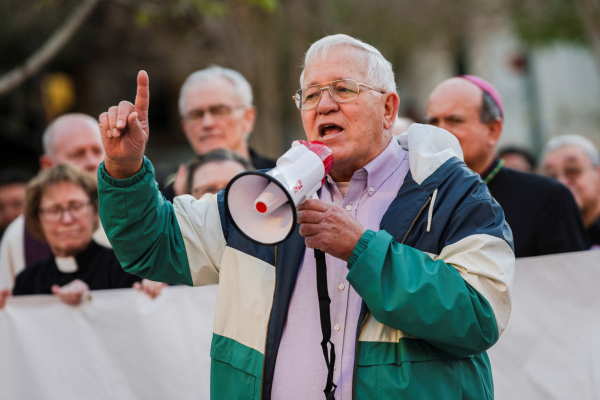At 4:45 a.m., Pastor José Chicas logs onto Facebook Live to lead his scattered congregation in prayer. Before the darkness lifts, most of his faithful will be on their way to work, carrying in their spirits that flame kindled in the early morning glow of a back-lit screen. With Christians around the world this Advent, they wait in hope for Emmanuel, “God with us.” But after logging off, Pastor José is alone again. Since entering the School for Conversion on Jun. 27, he has not left the small house where he lives on church property in Durham, N.C.
Pastor José aches at the order of Immigration and Customs Enforcement that he abandon his family, community, and congregation. He is one of a few dozen immigrants facing deportation who has taken sanctuary in a religious institution. A resident of North Carolina since the mid-80s, he went to his annual appointment with ICE in April and learned that the Trump administration would not renew his work visa. In order to execute a three-decade-old deportation order, ICE ordered José to purchase a plane ticket to his native El Salvador and prepare to leave his family, home, and church, never to return.
My office is next door to the small library that became José’s bedroom when he arrived in June. Each morning I interrupt his solitude, unless a neighbor has already delivered the McDonalds pancakes José enjoys as an occasional treat. Those Styrofoam packages contain the gifts of the Magi for him this season. I see them on the table and recall that the Christmas story depends on strangers willing to defy the governing authorities to celebrate the potential of a different political future.
But all is not calm, all is not bright, not this year. These past six months have etched deep lines in José’s face. On a small TV with rabbit ears, he follows the grainy images of protesters demanding a Dream Act to create a pathway to citizenship for participants in the Deferred Action for Childhood Arrivals program, initiated by the Obama administration. According to President Trump’s Sept. 2 executive order, these 800,000 young people face potential deportation in 2018, barring some legislative relief. Among them is José’s oldest son.
When the Magi told King Herod about the heaven-sent child they’d come to honor, Herod also issued an executive order — kill every Hebrew child under 2. Herod’s henchmen would have slaughtered the Christ child along with the others had his parents not acted quickly to cross a border and protect their baby. Mary and Joseph were dreamers before Jesus. To prepare for Christmas is to remember Mary and Joseph’s dream and the civil disobedience it inspired.
While Congress dawdles over a potential Dream Act, no legislative proposal exists to recognize José’s dream, even less the three decades in which he has paid into Social Security, invested in his community, and pastored a church. ICE says 960,000 people in the U.S. walk in Jose’s shoes today. Both Republican and Democratic regimes have offered them stays of removal and status to work, often for decades. But since Jan. 20, the Trump administration has consistently ordered them to leave their homes and families.
Meanwhile, 300,000 refugees from Haiti and Central America have lived in the United States under Temporary Protected Status, many of them also for years. ICE now denies Haitians and Nicaraguans TPS, and other Central Americans’ status remains under review. So in addition to the Dreamers, neighbors that depend on TPS — many of them parents of U.S. citizens — could be forcibly separated from their families in 2018.
The National Sanctuary Movement, a loosely connected association of local congregations, estimates that 800 faith communities in the United States are committed to protect and stand with immigrants facing deportation. We have done our best to mount a moral challenge to the policy violence that quietly divides families and communities. But an honest observer would have to admit that there is already no room in the inn.
Even so, José has found a place, just as others have and will. It is not a barn, though we are still trying to catch the rat that José hears running in the walls at night. A steady stream of migrant workers and contemporary magi stop by each day bearing gifts, sharing food, and conversation. We are, unwittingly, both a living nativity and a glimpse of America's future. We are here, waiting. And God waits with us.
Got something to say about what you're reading? We value your feedback!







